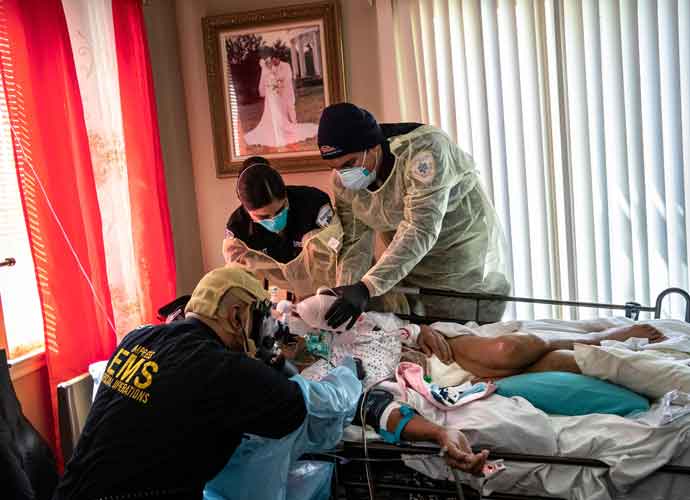

YONKERS, NY - APRIL 06: Medics wearing personal protective equipment (PPE), intubate a gravely ill patient with COVID-19 symptoms at his home on April 06, 2020 in Yonkers, New York. The man, 92, was barely breathing when they arrived, and they performed a rapid sequence intubation (RSI), on him before transporting him by ambulance to St. John's Riverside Hospital. The medics (L-R) are Capt. AJ Briones (paramedic), Michelle Melo (EMT), Carlos Cabrera (EMT). The Empress EMS employees treat and transport patients to hospitals throughout Westchester County and parts of New York City, the epicenter of the coronavirus pandemic in the United States. (Image: Getty)
The CDC released a new study on Monday, revealing that around 78% of people who have been hospitalized for COVID-19 were overweight or obese.
In a study of adults who tested positive for COVID-19 were hospitalized, according to data on emergency department or inpatient visits at 238 U.S. hospitals from March to December, 27.8% were overweight and 50.2% were obese. In the past, the CDC has reported a link between obesity and severe illness, and hospitalization. This is most likely because obesity is often correlated with weakened immune function and decreased lung capacity, both of which can render ventilation difficult.
The CDC found that individuals with a body mass index of under 25 were at the lowest risk of hospitalization for COVID. However, the agency reports that, among those who are 65 and over, the risk of severe illness “sharply increased” as their BMIs rose.
In 2018, 42% of the U.S. population was obese. Obesity is defined as having a BMI of 30 or more, while overweight is defined as having a BMI of 25 or more. A man who is 5’10” and 175 pounds and a woman who is 5’4” and 146 pounds would both be considered overweight, as their BMIs would surpass 25. Additionally, a man and woman of those same heights would be “obese” at 210 and 175 pounds, respectively, according to the CDC’s BMI calculator.
Subscribe to our free weekly newsletter!
A week of political news in your in-box.
We find the news you need to know, so you don't have to.
According to the CDC, obesity is most prevalent among non-Hispanic Black adults, followed by Hispanic adults and non-Hispanic white people.
Though the study presents important findings on the link between COVID and obesity, the findings should be taken with a grain of salt. The study was limited to examining adult patients who received care at a hospital, meaning the risk estimates for severe COVID-19 might differ among all adults who contracted the virus. Furthermore, the report only looked at patients who chose to report their height and weight.
The CDC stressed the importance of vaccine prioritization, masking, and promoting proper nutrition and exercise. Additionally, the CDC urged clinicians to consider patients with high BMIs and/or obesity when making decisions regarding their healthcare.
The CDC wrote: “As clinicians develop care plans for COVID-19 patients, they should consider the risk for severe outcomes in patients with higher BMIs, especially for those with severe obesity.”
President Donald Trump's administration has implemented stricter regulations on immigration and visas. The administration has…
Pollster Gallup released a new favorability survey on 14 global public figures this week, including…
Eleanor Holmes Norton, Washington, D.C.’s nonvoting delegate to the House of Representatives, on Monday criticized…
On Thursday, Attorney General Pam Bondi rescinded numerous policing policies on immigration in Washington, D.C.,…
A group of former FBI, intelligence and national security officials known as The Steady State…
The Department of Justice (DOJ) is attempting to unseal the grand jury testimony in the…